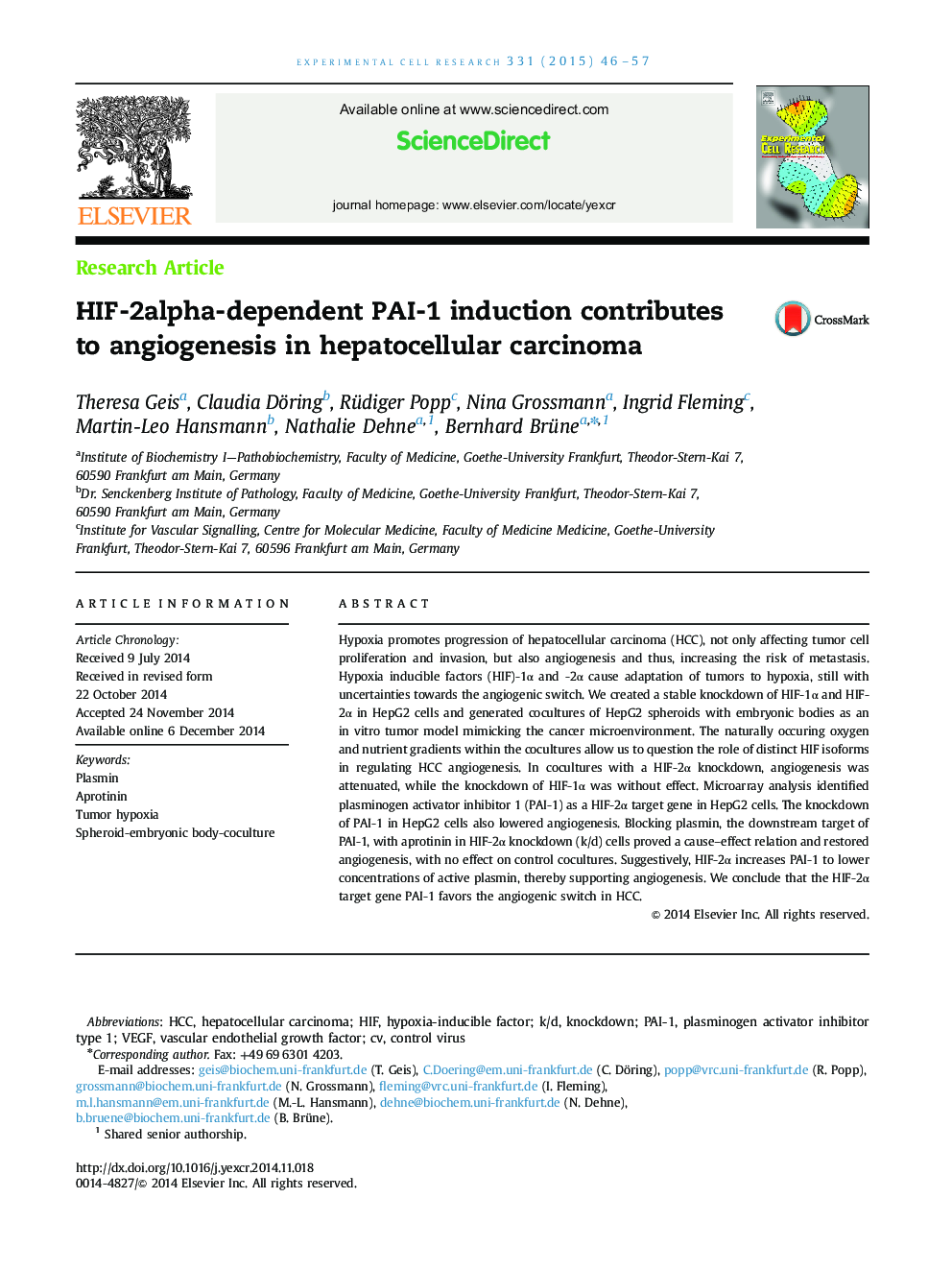| کد مقاله | کد نشریه | سال انتشار | مقاله انگلیسی | نسخه تمام متن |
|---|---|---|---|---|
| 10903930 | 1086541 | 2015 | 12 صفحه PDF | دانلود رایگان |
عنوان انگلیسی مقاله ISI
HIF-2alpha-dependent PAI-1 induction contributes to angiogenesis in hepatocellular carcinoma
دانلود مقاله + سفارش ترجمه
دانلود مقاله ISI انگلیسی
رایگان برای ایرانیان
کلمات کلیدی
AprotininHIFPAI-1HCC - HCCHypoxia-inducible factor - فاکتور القاء کننده هیپوکسیVascular endothelial growth factor - فاکتور رشد اندوتلیال عروقیVascular Endothelial Growth Factor (VEGF) - فاکتور رشد اندوتلیال عروقی (VEGF)Knockdown - نابودیPlasminogen activator inhibitor type 1 - نوع مهار کننده فعال کننده پلاسمینوژن 1Tumor hypoxia - هیپوکسی تومورPlasmin - پلاسمینHepatocellular carcinoma - کارسینوم هپاتوسلولار(کارسینوم سلولهای استخوانی)
موضوعات مرتبط
علوم زیستی و بیوفناوری
بیوشیمی، ژنتیک و زیست شناسی مولکولی
تحقیقات سرطان
پیش نمایش صفحه اول مقاله

چکیده انگلیسی
Hypoxia promotes progression of hepatocellular carcinoma (HCC), not only affecting tumor cell proliferation and invasion, but also angiogenesis and thus, increasing the risk of metastasis. Hypoxia inducible factors (HIF)-1α and -2α cause adaptation of tumors to hypoxia, still with uncertainties towards the angiogenic switch. We created a stable knockdown of HIF-1α and HIF-2α in HepG2 cells and generated cocultures of HepG2 spheroids with embryonic bodies as an in vitro tumor model mimicking the cancer microenvironment. The naturally occuring oxygen and nutrient gradients within the cocultures allow us to question the role of distinct HIF isoforms in regulating HCC angiogenesis. In cocultures with a HIF-2α knockdown, angiogenesis was attenuated, while the knockdown of HIF-1α was without effect. Microarray analysis identified plasminogen activator inhibitor 1 (PAI-1) as a HIF-2α target gene in HepG2 cells. The knockdown of PAI-1 in HepG2 cells also lowered angiogenesis. Blocking plasmin, the downstream target of PAI-1, with aprotinin in HIF-2α knockdown (k/d) cells proved a cause-effect relation and restored angiogenesis, with no effect on control cocultures. Suggestively, HIF-2α increases PAI-1 to lower concentrations of active plasmin, thereby supporting angiogenesis. We conclude that the HIF-2α target gene PAI-1 favors the angiogenic switch in HCC.
ناشر
Database: Elsevier - ScienceDirect (ساینس دایرکت)
Journal: Experimental Cell Research - Volume 331, Issue 1, 1 February 2015, Pages 46-57
Journal: Experimental Cell Research - Volume 331, Issue 1, 1 February 2015, Pages 46-57
نویسندگان
Theresa Geis, Claudia Döring, Rüdiger Popp, Nina Grossmann, Ingrid Fleming, Martin-Leo Hansmann, Nathalie Dehne, Bernhard Brüne,